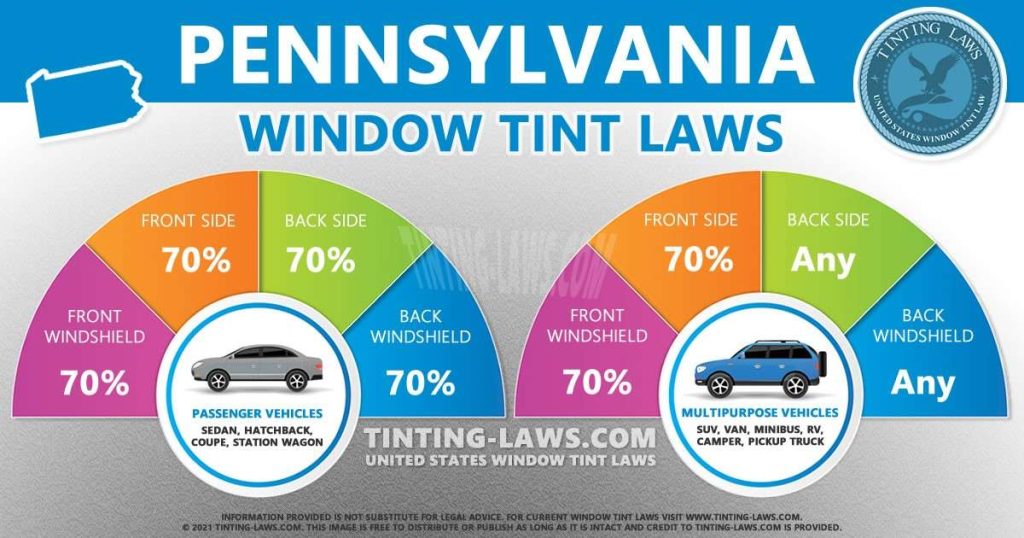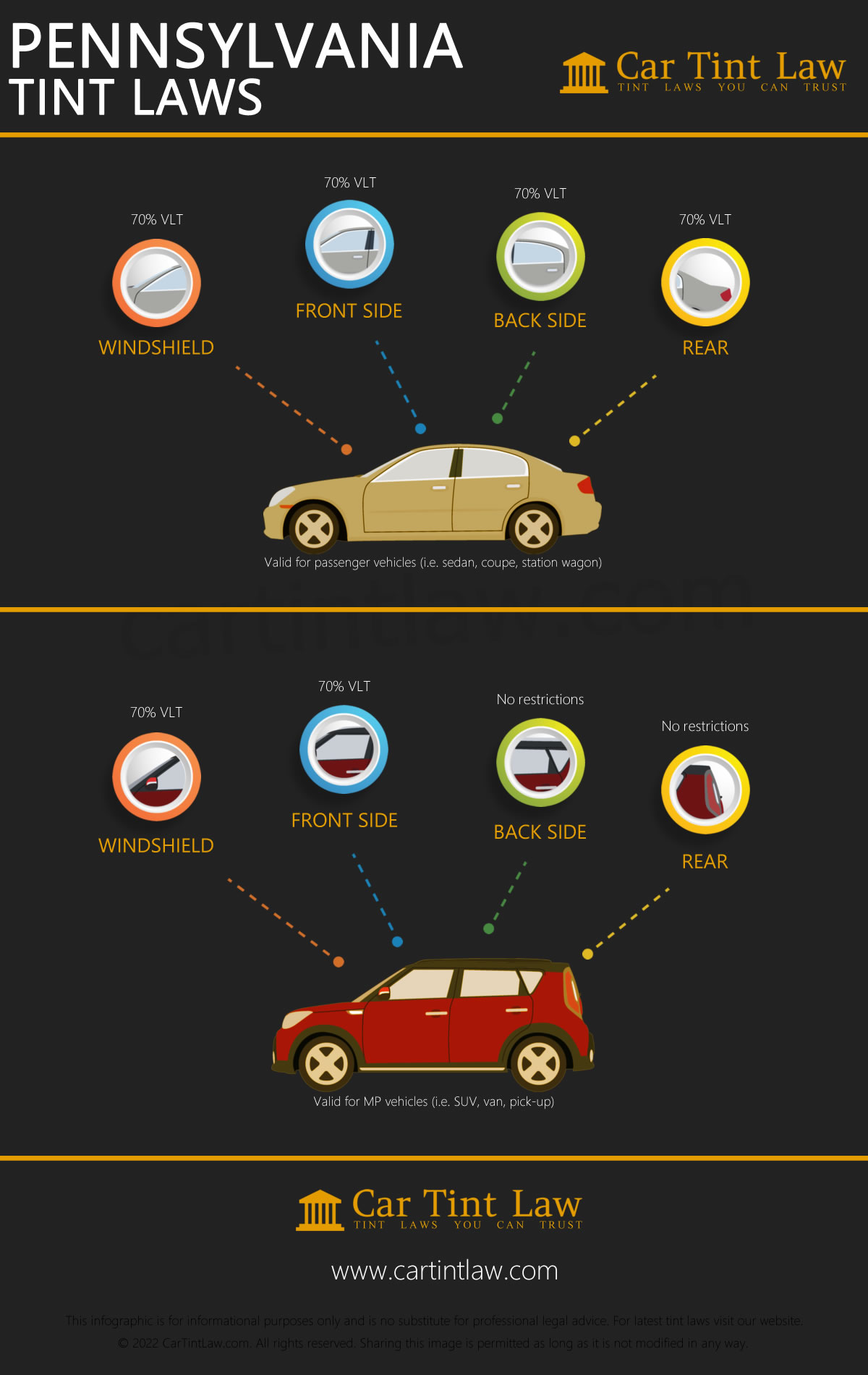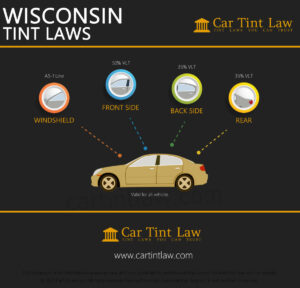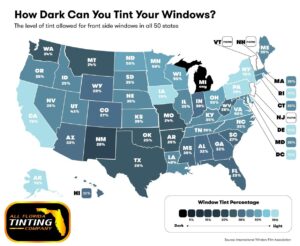As an Amazon Associate, I earn from qualifying purchases
Understanding car tint laws in Pennsylvania is crucial for drivers. These laws ensure safety and compliance while on the road.
Pennsylvania has specific regulations for car window tints that every driver should know. Whether you’re considering tinting your car windows or already have tinted windows, being aware of these laws can save you from fines and legal issues. Car tint laws vary from state to state, and Pennsylvania is no different.
Knowing the permissible tint levels for different windows and understanding the exceptions can help you stay compliant. This blog will provide a comprehensive guide on Pennsylvania’s car tint laws, helping you make informed decisions about your vehicle’s window tints. Stay tuned to learn more about what’s allowed and what isn’t when it comes to tinting your car windows in Pennsylvania.

Credit: www.tinting-laws.com
Introduction To Car Tinting Laws
Car tinting has become a popular choice among vehicle owners. It offers both aesthetic and practical benefits. Yet, different states have different regulations. In Pennsylvania, car tinting laws are specific and must be followed to avoid penalties. Understanding these laws can help you make informed decisions about tinting your car windows.
Importance Of Tinting Laws
Tinting laws are in place for several reasons. They ensure safety and clarity for all road users. Dark tints can reduce visibility. This affects the driver’s ability to see clearly, especially at night. Following tinting laws helps maintain the safety of everyone on the road.
Law enforcement also benefits from these rules. Dark tints make it hard for police officers to see inside the vehicle. This can pose a threat to their safety during traffic stops. By regulating the level of tint, the laws help ensure safety for law enforcement personnel.
Purpose Of Window Tinting
There are several reasons why people choose to tint their car windows. Here are some common purposes:
- UV Protection: Tinted windows block harmful UV rays. This protects the car’s interior and the occupants.
- Heat Reduction: Tinting can reduce the heat inside the car. This makes the ride more comfortable.
- Privacy: Tinted windows offer more privacy. They make it difficult for outsiders to see inside the vehicle.
- Glare Reduction: Tinting reduces glare from the sun and headlights. This improves visibility and comfort.
Each of these purposes highlights the benefits of window tinting. However, it is essential to balance these benefits with the legal requirements in your state.
Legal Tint Percentage In PA
Understanding the legal tint percentage in PA is crucial for car owners. This ensures your vehicle complies with state regulations. Pennsylvania has specific rules regarding window tinting. These rules are important for safety and visibility. Knowing these regulations can help you avoid fines and penalties.
Allowed Tint Levels
Pennsylvania law dictates different tint levels for various windows. For sedans, the front side windows must allow over 70% of light. The backside windows can be darker. The rear window must also allow over 70% of light.
SUVs and vans have slightly different rules. The front side windows still need to allow over 70% of light. The back and rear windows can have any tint level. This provides more flexibility for these vehicles.
Vlt Explained
VLT stands for Visible Light Transmission. It measures the amount of light that passes through your window tint. Higher VLT means more light passes through. Lower VLT means less light passes through.
In PA, the legal VLT for front side windows is 70%. This means 70% of light must pass through the tint. The back and rear windows have more lenient rules. For sedans, they must also allow 70% of light. For SUVs and vans, any VLT is acceptable.
Understanding VLT helps you choose the right tint. It ensures your vehicle meets PA regulations. This keeps you on the right side of the law.
Types Of Windows And Tint Limits
Understanding Pennsylvania’s car tint laws helps you avoid penalties and maintain road safety. Different types of windows in your car have specific tint limits. These limits ensure clear visibility for safe driving. Let’s explore the details.
Windshield Restrictions
The windshield must allow clear visibility. Only a non-reflective tint strip is allowed. This strip can be along the top of the windshield. It should not extend more than three inches down.
Side And Rear Window Tinting
Front-side windows must allow over 70% of light in. They ensure the driver has a clear view. Rear side windows can be darker. There are no specific light transmission limits for rear side windows. But, they must allow visibility from outside.
Rear windows, like rear side windows, have no specific tint limits. They can be darker. But, they should not impair visibility. Always ensure your vehicle’s tint meets Pennsylvania’s standards.

Credit: www.raynofilm.com
Penalties For Illegal Tinting
Car tinting laws in Pennsylvania are strict. Illegal tinting can lead to various penalties. Understanding these penalties can help you avoid unnecessary trouble.
Fines And Tickets
Illegal tinting can result in fines and tickets. The fines can range from $100 to $200 for a first offense. Repeated violations can lead to higher fines. It’s essential to know the legal limits for window tinting in Pennsylvania.
| Offense | Fine Amount |
|---|---|
| First Offense | $100 – $200 |
| Second Offense | $200 – $300 |
| Third Offense | $300 – $500 |
In addition to fines, you may also receive a ticket. This ticket can affect your driving record. It may also lead to increased insurance rates.
Potential Safety Risks
Illegal tinting can pose safety risks. Dark tints reduce visibility, especially at night. This can lead to accidents. In emergencies, first responders may struggle to see inside your car. This can delay necessary help.
Furthermore, dark tints can make it difficult for other drivers to see your signals. This increases the chances of collisions. Keeping within the legal tint limits ensures better safety for you and others on the road.
Exemptions And Special Cases
Understanding the exemptions and special cases in Pennsylvania car tint laws is crucial. These exemptions ensure compliance while accommodating unique needs. It’s important to know the specific situations where these rules apply.
Medical Exemptions
Some individuals have medical conditions requiring special window tints. Conditions like lupus, albinism, or photosensitivity to sunlight qualify. These individuals can apply for a medical exemption. A physician’s certification is necessary. This certification must state the specific condition and need for tint. Once approved, the vehicle can have darker tints than normally allowed.
Commercial Vehicles
Commercial vehicles often have different tint regulations. These vehicles may require tints for safety or privacy. Delivery vans, taxis, and buses fall under this category. The rules vary slightly for each type. Always check the specific requirements for your vehicle type. Compliance ensures safety for both the driver and passengers.

Credit: www.cartintlaw.com
Choosing The Right Tint
Choosing the right tint for your car windows in Pennsylvania can be a daunting task. You need to consider legal restrictions, safety, and aesthetics. To make an informed decision, you must understand the various options available. This section will guide you through the process, highlighting legal and safe options, and comparing professional vs. DIY tinting. Let’s dive in and ensure you make the best choice for your vehicle.
Legal And Safe Options
In Pennsylvania, car window tinting laws specify the maximum allowable tint darkness. For passenger vehicles, the front side windows must allow more than 70% of light in. The back side and rear windows can be darker, but must still comply with safety standards. Always verify the latest regulations before making a decision. Choosing a legal tint ensures you avoid fines and keeps your car safe on the road.
Safety is another critical factor. Dark tints may look stylish, but can reduce visibility, especially at night. This can increase the risk of accidents. Consider a tint that balances aesthetics and safety. Choose a shade that enhances your car’s look without compromising your ability to see clearly.
Professional Vs. Diy Tinting
Professional tinting offers several advantages. Experts have the skills and tools to apply the tint smoothly and evenly. They also use high-quality materials that last longer. A professional job often comes with a warranty, giving you peace of mind.
DIY tinting can be a cost-effective option. Many kits are available for purchase, and with patience, you can achieve decent results. However, DIY projects can be challenging. Improper application may lead to bubbles, peeling, or uneven coverage. Weigh the pros and cons before deciding. If you value quality and longevity, professional tinting might be a better choice.
Maintaining Your Tinted Windows
Maintaining your tinted windows in Pennsylvania is essential for ensuring their longevity and effectiveness. Proper care can help prevent scratches, bubbles, and fading. Follow these tips to keep your tinted windows in top condition.
Cleaning Tips
Clean tinted windows with a gentle, ammonia-free cleaner. Harsh chemicals can damage the tint. Use a soft cloth or sponge to avoid scratches.
- Mix a solution of mild soap and water.
- Spray the cleaner onto the cloth, not directly on the window.
- Wipe in a circular motion to avoid streaks.
Dry the window with a microfiber cloth to prevent water spots. Clean your windows regularly to maintain clarity and appearance.
Durability And Longevity
To ensure the durability and longevity of your window tint, avoid using sharp objects near the windows. Small scratches can lead to peeling.
- Do not use abrasive materials for cleaning.
- Park in the shade to protect the tint from UV rays.
- Consider using sunshades to reduce direct sunlight exposure.
Proper maintenance can extend the life of your window tint significantly. Regular checks for bubbles or peeling can help address issues early.
Conclusion And Final Tips
Understanding Pa car tint laws helps you avoid fines and stay safe. Always check local rules before tinting.
Understanding Pennsylvania’s car tint laws ensures you stay compliant. Knowing the rules helps avoid fines. It also keeps you safe on the road. This section will recap key points and share tips.
Recap Of Key Points
Pennsylvania allows certain tint percentages. Each window type has specific rules. The front windshield must allow 70% light. Side windows need to allow 70% light. Rear windows can be darker. Medical exemptions exist for certain conditions. Always carry your documentation.
Where To Get More Information
Check the Pennsylvania Department of Transportation website. It has detailed guidelines. Contact local DMV offices. They provide up-to-date information. Consult with professional tinting services. They know the current laws and regulations. Following these steps ensures you have the right information. “`
Frequently Asked Questions
What Are The Window Tint Laws In Pennsylvania?
In Pennsylvania, the front side windows must allow over 70% light in. The rear side and back windows can have any tint darkness.
Can I Have Tinted Windows On My Car In PA?
Yes, but the front side windows must allow more than 70% light in. The rear side and back windows have no restrictions on tint darkness.
Are There Medical Exemptions For Tint Laws In PA?
Yes, Pennsylvania allows medical exemptions for window tint. The exemption requires a physician’s certification and approval from the Pennsylvania Department of Transportation.
How Do I Get A Tint Waiver In Pennsylvania?
To get a tint waiver, you need a doctor’s certification. Submit it to the Pennsylvania Department of Transportation for approval.
Conclusion
Understanding PA car tint laws ensures you avoid fines. Stay informed and compliant. Research local regulations before tinting your car windows. This helps you choose the right tint. Safe driving also means legal tinting. Always prioritize safety and legality. Consult professionals for accurate advice.
Enjoy the benefits of tinted windows responsibly. Legal tints enhance comfort without breaking the law. Drive confidently with compliant window tints.
As an Amazon Associate, I earn from qualifying purchases


